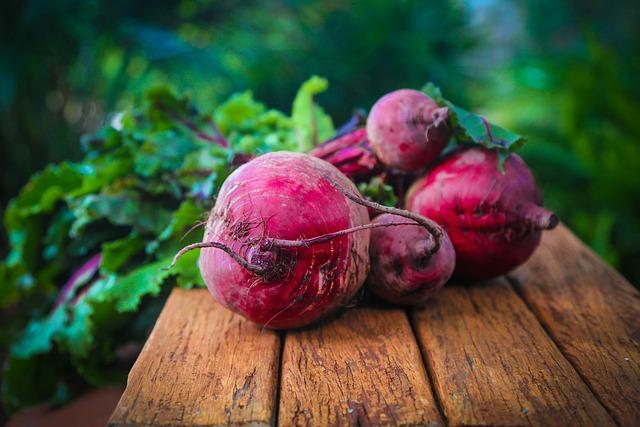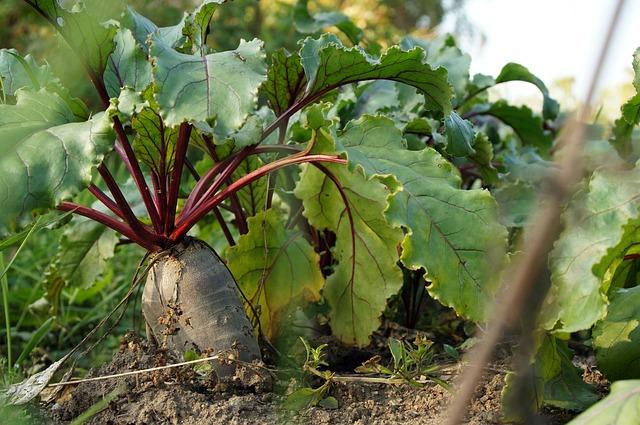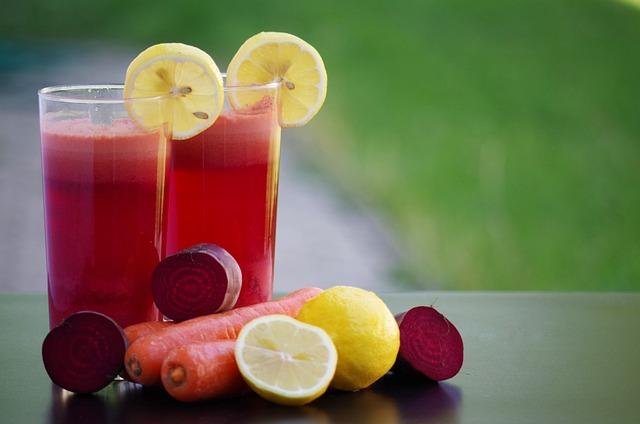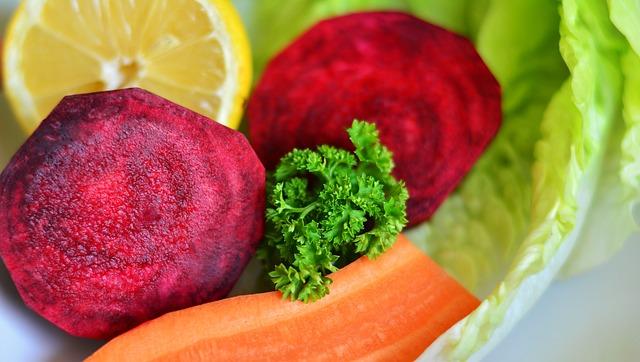No products in the cart.
Benefits of Beetroot: Top 10 Health Benefits Revealed
Beetroot, also known as beets, is one of the healthiest vegetables available in the market. They are low in calories, high in fiber, and packed with essential nutrients that can improve overall health. The history of Beetroot dates back to ancient times when it was used for medicinal purposes in Rome and Greece. Today, Beetroot is popularly used in various cuisines worldwide, and its benefits are widely recognized in the health and fitness community. This article aims to highlight the top 10 health benefits of Beetroot and provide readers with scientific evidence and recipes to incorporate Beetroot into their diets. From promoting heart health to aiding digestion, Beetroot is a versatile vegetable that offers numerous health benefits.

Let’s take a deep dive and understand the importance of beetroot to our health and how to incorporate it into your daily diet.
Health Benefits of Beetroot
Promotes heart health
One of the most notable benefits of beetroot is its ability to promote heart health. Several studies have shown that regular consumption of beetroot can reduce the risk of heart disease.
Beetroot contains a high concentration of nitrates, which can be converted into nitric oxide in the body. Nitric oxide plays a vital role in maintaining healthy blood vessels and improving blood flow throughout the body. By promoting vasodilation, or the widening of blood vessels, beetroot helps to reduce blood pressure, improve circulation, and decrease the risk of cardiovascular disease.
Enhances Exercise Performance
Beetroot is increasingly recognized as a natural performance enhancer for athletes and fitness enthusiasts alike. This root vegetable is packed with nitrates, which are converted into nitric oxide in the body. Nitric oxide, in turn, can improve blood flow and oxygen delivery to the muscles, leading to enhanced exercise performance.
When consumed, nitrates in beetroot are converted into nitrites, which are then further converted into nitric oxide. Nitric oxide helps to relax and widen blood vessels, which increases blood flow and oxygen delivery to the muscles. This increased blood flow can help reduce the oxygen cost of exercise and delay the onset of fatigue during high-intensity workouts. In addition, nitric oxide may also help to increase glucose uptake in muscles, providing an additional source of energy for exercise.
Boosts Brain Function
The nitrates found in beetroot are converted into nitric oxide in the body, which can help to improve blood flow to the brain. Increased blood flow can lead to improved cognitive function, memory, and focus.
Nitric oxide is a vasodilator, which means it helps to widen blood vessels and increase blood flow. This increase in blood flow can help to deliver more oxygen and nutrients to the brain, which can improve cognitive function. Additionally, the nitrates found in beetroot can help to reduce inflammation in the brain, which can further improve brain health.
Moreover, beetroot juice has been studied for its potential benefits in slowing the progression of dementia. This deep-red vegetable is rich in nitrates, which are converted into nitric oxide in the body. Nitric oxide helps to increase blood flow to the brain, improving oxygen and nutrient delivery to brain cells.
To enjoy the brain-boosting benefits of beetroot, consider incorporating it into a smoothie recipe. Here are some tasty beetroot smoothie recipes to try out;
Aids Digestion
Beetroot is high in fiber, which can help to regulate bowel movements and prevent constipation. Fiber adds bulk to stools, making them easier to pass through the digestive tract. Secondly, beetroot is rich in betaine, a compound that can help to increase stomach acid levels, aiding in the breakdown and digestion of food.
Additionally, beetroot contains a variety of antioxidants and anti-inflammatory compounds that can help to reduce inflammation in the digestive tract. Inflammation can lead to digestive issues such as bloating, gas, and discomfort, so reducing inflammation can help to improve overall digestion.
Lowers Blood Pressure
Beetroot contains high levels of vitamins, minerals, and antioxidants that help boost the immune system and reduce the risk of chronic diseases. One of the unique properties of beetroot is its ability to lower blood pressure. This is because it contains a high concentration of nitrates, which are converted to nitric oxide in the body. Nitric oxide helps relax and dilate blood vessels, reducing blood pressure and improving blood flow. Studies have shown that drinking beetroot juice or consuming beetroot supplements can significantly reduce blood pressure in individuals with hypertension. However, it is important to note that beetroot should not be considered a substitute for medication prescribed by a healthcare professional.
High blood pressure, also known as hypertension, is a common condition that affects millions of people worldwide. It is a major risk factor for heart disease, stroke, and kidney failure. Lifestyle changes such as maintaining a healthy diet, regular exercise, and avoiding smoking and alcohol can help lower blood pressure. Incorporating beetroot into your diet is another way to manage hypertension. Its high nitrate content and blood pressure-lowering properties make it a valuable addition to a healthy diet. Whether consumed as a juice, roasted or added to salads, beetroot is a versatile vegetable that can help improve heart health and reduce the risk of chronic diseases.
Anti-Cancer Properties
Beetroot contains a compound called betalain, which is responsible for the vegetable’s deep red color. Betalains are powerful antioxidants that have been shown to have anti-inflammatory and anti-cancer effects. Studies have suggested that beetroot consumption may be beneficial in preventing and treating various types of cancer, including lung, breast, prostate, and colon cancer. Additionally, beetroot is a rich source of fiber, vitamins, and minerals, which may also contribute to its cancer-fighting properties.
Helps with Anemia
Beetroot is known to be an excellent source of iron, a mineral that is essential for the production of red blood cells in the body. It is also high in folic acid, vitamin C, and other nutrients that aid in the absorption and utilization of iron. As a result, beetroot is a natural remedy for anemia, a condition in which there are not enough red blood cells to carry oxygen to the body’s tissues. By including beetroot in your diet, you can increase your iron intake, improve the production of red blood cells, and combat the symptoms of anemia. Furthermore, beetroot’s antioxidant properties help to protect the red blood cells from damage, ensuring that they function optimally.

Supports Liver Health
One of the key benefits of beetroot is its ability to support liver health. The liver plays a critical role in detoxifying the body and removing harmful substances. Beetroot contains a group of compounds called betalains, which have been shown to have antioxidant and anti-inflammatory properties. These compounds help protect the liver from damage caused by toxins and other harmful substances. Additionally, beetroot is high in fiber, which helps promote healthy digestion and elimination, further supporting liver health.
Liver health is essential for overall health and well-being, and certain nutrients and foods can help support its function. In addition to beetroot, liver-friendly foods include leafy greens, cruciferous vegetables, garlic, and turmeric. The liver is responsible for processing and metabolizing nutrients, and these foods contain compounds that can help support these processes. Additionally, these foods are rich in vitamins, minerals, and antioxidants, which are essential for overall health and can help protect the liver from damage.
Ways You Can Enjoy Beetroot
Here are some interesting beetroot smoothie recipes you can try out within minutes;
Beetroot and Berry Smoothie recipe
Ingredients:
- 1 small beetroot, peeled and chopped
- 1 cup frozen mixed berries
- 1 banana, peeled and chopped
- 1 cup almond milk
- 1 tbsp honey
Instructions:
- Add the chopped beetroot, frozen berries, and banana to a blender.
- Pour in the almond milk and honey.
- Blend all ingredients together until smooth and creamy.
- Serve immediately and enjoy!
Beetroot and Mango Smoothie Recipe
Ingredients:
- 1 small beetroot, peeled and chopped
- 1 ripe mango, peeled and chopped
- 1 banana, peeled and chopped
- 1/2 cup plain Greek yogurt
- 1/2 cup almond milk
- 1 tsp honey
Instructions:
- Add the chopped beetroot, mango, banana, Greek yogurt, almond milk, and honey to a blender.
- Blend all ingredients together until smooth and well combined.
- Pour into a glass and serve immediately. Enjoy!

Beetroot Hummus Recipe
Ingredients:
- 2 medium-sized cooked beetroots
- 1 can of chickpeas, drained and rinsed
- 2 garlic cloves, minced
- 2 tbsp tahini
- 3 tbsp lemon juice
- 1/4 cup olive oil
- Salt and pepper, to taste
- Optional toppings: chopped fresh parsley, chopped walnuts
Instructions:
- Peel and chop the cooked beetroots into small pieces.
- In a food processor, add chickpeas, garlic, tahini, lemon juice, and olive oil. Pulse until smooth.
- Add the chopped beetroot and pulse again until well combined.
- Season with salt and pepper to taste.
- Transfer to a serving bowl and top with chopped fresh parsley and/or chopped walnuts, if desired.
Roasted Beetroot Salad Recipes
Ingredients:
- 4 medium-sized beetroots, peeled and chopped
- 1 tbsp olive oil
- Salt and pepper, to taste
- 2 cups baby spinach
- 1/2 cup crumbled feta cheese
- 1/4 cup chopped walnuts
- 2 tbsp balsamic vinegar
- 1 tbsp honey
Instructions:
- Preheat oven to 400°F (200°C).
- In a mixing bowl, toss the chopped beetroots with olive oil, salt, and pepper.
- Spread the beetroots out on a baking sheet and roast in the oven for 20-25 minutes or until tender.
- In a small bowl, whisk together balsamic vinegar and honey to make the dressing.
- In a serving bowl, layer baby spinach, roasted beetroot, crumbled feta cheese, and chopped walnuts.
- Drizzle the balsamic honey dressing over the salad and serve.
Beetroot Risotto Recipes
Ingredients:
- 2 tbsp butter
- 1 onion, finely chopped
- 2 garlic cloves, minced
- 1 1/2 cups Arborio rice
- 1/2 cup white wine
- 4 cups vegetable broth
- 2 medium-sized beetroots, peeled and grated
- 1/2 cup grated parmesan cheese
- Salt and pepper, to taste
Instructions:
- In a large saucepan, melt the butter over medium heat.
- Add the onion and garlic and cook until softened.
- Add the Arborio rice and stir to coat in the butter mixture.
- Pour in the white wine and stir until absorbed.
- Gradually add the vegetable broth, stirring continuously, and cook until the rice is tender and creamy.
- Stir in the grated beetroot and cook for an additional 2-3 minutes or until heated through.
- Remove from heat and stir in the grated parmesan cheese.
- Season with salt and pepper to taste.
- Serve immediately.
Precautions
While the beetroot is generally considered safe and nutritious, consuming too much of it may have some potential side effects. The high levels of nitrates in beetroot can lead to a temporary drop in blood pressure, which may cause lightheadedness, dizziness, or fainting in some people. Additionally, the high fiber content in beetroot may cause digestive discomforts such as bloating, gas, or diarrhea if consumed in excessive amounts. Some people may also experience an allergic reaction to beetroot, characterized by itching, swelling, or hives. Beetroot can also turn urine and stool a reddish-pink color, which is harmless but may be alarming to some people. As with any food, it is important to consume beetroot in moderation and listen to your body’s reactions to ensure that it is well-tolerated.

Next Steps
Beetroot is a nutrient-dense vegetable that offers numerous health benefits, including promoting heart health, enhancing exercise performance, boosting brain function, aiding digestion, lowering blood pressure, and possessing anti-cancer properties.
Incorporating beetroot into your diet is easy and delicious. You can enjoy it raw in salads or sandwiches, roasted as a side dish, or blended into smoothies or juices. Consider adding beetroot to your regular diet to reap its many health benefits, including supporting liver health.


